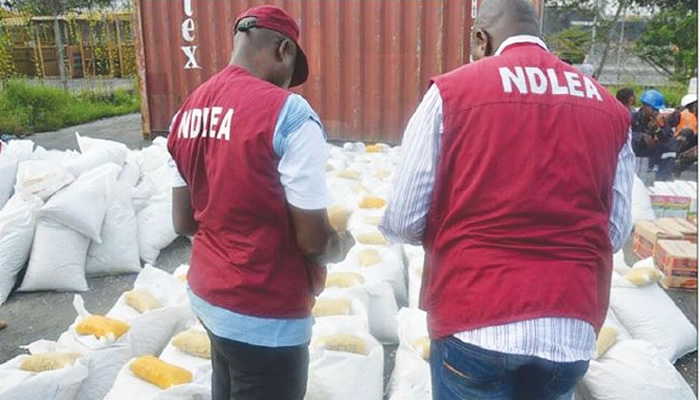...To get all news updates, Join our WhatsApp Group (Click Here)
Also Join our WhatsApp Channel (Click Here)
The National Drug Law Enforcement Agency has said the menace of drug abuse in the country is a ticking bomb that all stakeholders must rise to fight elaborately.
The anti-narcotic agency disclosed that the menace has become a serious national issue as the proliferation of drug abuse now cuts across classes of persons and regions in the country.
According to the NDLEA, the practice of abuse of drugs and addiction is not only peculiar among the street and common people, but also a challenge recording high indulgence among the very important persons (VIPs) in the country.
The Assistant Commander General of Narcotics, Directorate of Operations and Investigation, NDLEA, Mrs. Ibinabo Archie-Abia, said this on Tuesday while featuring in an interview on Arise TV Morning Show.
Speaking on how drug abuse is creating a challenge at the workplace, she said: “We go to the workplace, we organise seminars and workshops, we take it to their companies, and the factories because for most persons that abuse these drugs, people think they are the low class ones or those people you see on the road, it’s not true. We have high profile persons abusing drugs, managing directors, VIPs or their children into drugs. So these things translate to the work places.
“For the VIPs, they have the money to do the drugs, we are also talking to them. They can come out of it if they have the will because it’s doing them no good, rather it’s destroying their persons. We have so many of them.”
She decried the prevalent abuse of drugs among children and women in the country, saying the statistics show “for every four abusers of drugs there are three females.”
“The drug problem is now very highly worrisome. I want to see it now as an epidemic in Nigeria. Nigerians ought to know that primary school pupils are also in drugs now, girls are involved in drugs, as young as age nine they go into drugs. We have to be careful not to think it’s only in the secondary schools.
“We are not just talking to the youths, we are talking to the adults. Please be careful, save our nation.
“It’s a big issue, it’s challenging, it’s worrisome, in fact, it’s a ticking timed bomb,” she said, adding that “even pregnant women are into it and they don’t get help. Because of the stigma, the women hide away, they don’t do it in public, but they are hooked on drugs.”
She said addicts of drugs could be treated and rehabilitated to get freed from the problem, but called on relevant stakeholders to contribute to identification of cases for intervention, while warning against stigmatising victims of the menace.
“Recently we counselled the children of very high profiled persons, some who were in schools and left, and they are hooked on drugs. We found them on the streets, and their parents came for us to help. We took them in and they are now restored.
“We have experts trained to address this situation, so nobody should be labelled or stigmatised because he/she is challenged with substance use. All they need is help. We see it as a mental issue. If you can treat malaria, you can also treat addictions. So let’s encourage them, the idea of hiding them, living a life of denial, is not helpful,” she said.
According to her, the spread of drug abuse in the Country is not isolated to any particularly geo-political zone in the Country, but there was much concentration in the North, the Southwest and the South-south.
“I want to say it’s a national issue. There’s no state that is insulated from this scourge called drug abuse and illicit trafficking. Every State, even the ones you think will never get involved, are all in it.
“But for the purposes of enlightenment, I want to say that, and that’s not like stigmatising any region, we have a major problem in the South-west, North, and the South-south. Majorly in the North, what we contend against is the local substances they abuse, they do lots of tramadol and that is understandable too.
“When it comes to the South-west because of our porous borders, the airports, the seaports and the exposure of the people, they also abuse drugs so much and they traffic in drugs.
So predominantly, for every region in Nigeria, there is nothing that is insulated,” she said.
She disclosed that given the clampdown on traffickers using sea and air ports to traffic drugs, the perpetrators of substance proliferation have shifted to localising the production of substances within the country.
“Nigeria was first referred to as a transit nation because of the network of our airlines. You can connect most parts of the world from Nigeria, so it was easy for people coming into our nation and trafficking substances through our sea and air ports. But recently, there’s been a new sheriff in town that uttered that we have strict enforcement measures in place, at the airports, seaports, the land borders everywhere, and we do intercity interdictions and operations taking out these drugs and now they are not very easy again, but what they do now is that they localise it and that’s the bane now and that’s what we are working seriously on.
“We go on raids and we are now having a balanced approach to curb the menace of the high consumption rate,” she said.
Speaking on the commemoration of the World Drug Day scheduled for Wednesday and the need to educate Nigerians, she called faith-based organisations and other stakeholders to rise to the need to enhance the campaign against drug abuse in the country.
“There is still much to be done, most churches are not talking and we are appealing to them to come on board and use this time to also sensitise the people that there is a need for us all to speak to amplify this voice that drug is not beautiful, it’s highly destructive.
“We are calling on everyone, the government, policy makers that the investment in drug eradication should not be left in the hands of NDLEA alone, it should be driven by everybody,” she said.
You can get every of our news as soon as they drop on WhatsApp ...To get all news updates, Join our WhatsApp Group (Click Here)
Also Join our WhatsApp Channel (Click Here)

















